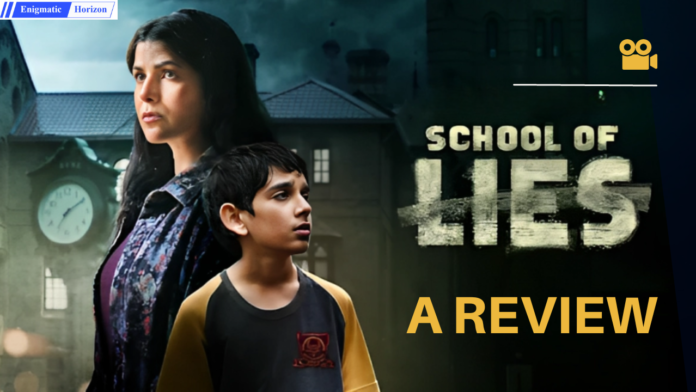Shubhi Agrawal
Unveiling Maya: Mythical Threads and Ethical Dilemmas
The first season of the web series “School of Lies,” which consists of a total of 8 episodes, premiered on June 2, 2023. The Hotstar special series is immersed in intrigue and mystery, with each episode taking you further into the maze. Nimrat Kaur delivers a nuanced performance, breathing life into a cast of troubled individuals who compel us to question our understanding of lying and the complex circumstances that can drive people to act against their true desires. The show is a dark drama series exploring themes such as deception, abuse, loneliness, toxic authority, and mental health that begin at a young age. The series poses fundamental questions about the nature of lying and the social anatomy of lies. The series is captivating and thrilling with its themes and thought-provoking parallels to Indian religion and mythology.
The series follows a 12-year-old named Shakti (Strength in Hindi) and his mysterious disappearance from his boarding school, River Isaac School of Education, and as the story unfolds, it seems that the school is drowning in an undercurrent of lies. setting the stage for a riveting investigation that uncovers a web of crime rackets within the River Isaac boarding school. The narrative ingeniously intertwines the lives of TK and Vikram, two senior students from the same house as Shakti, Rajpath House. However, what sets this series apart is its refusal to present a single character as the main antagonist. Instead, it introduces a collection of troubled, complex individuals, urging viewers not to pass judgement but rather to consider the extenuating circumstances that can compel people to act against their own desires.
“School of Lies” is grounded in a realistic setting while masterfully expressing dark themes and weaving mysterious narratives that explore religious concepts such as “Maya” and “Karma,” which adds to the complexity of the show.
In the series “School of Lies,” an entailing connection is evident as the series seamlessly explores parallels between Indian religion and mythology while maintaining its relatable and realistic quality. The focus of the series on the concept of things not being as they seem resonates strongly with the Indian philosophical concept of Maya and the illusionary nature of humans. The series skillfully unveils a world of lies and hidden truths for the audience, changing their view of the show’s reality of what is a lie and what is the truth as an intricate web of deception engulfs the characters, seamlessly aligning itself with the illusionary nature of Maya by presenting a truth that is far from what it seems.
All characters have their own arcs and stories facing moral dilemmas, strongly facing the question of rightful conduct (Dharma). As the Gordian knot of the story unravels, right or wrong, the characters come face-to-face with their sense of right or wrong, and as we go further into the twists and turns, the characters are forced to face the consequences of their decisions, inviting contemplation from the audience as the individual sense of Dharma shifts from character to character.
“School of Lies” can by no means be described as a show of the fantasy genre, but despite the realistic drama of the series, it is shrouded in an unusual aura of mystery that can be construed as mythological in nature. The mysterious disappearance of Shakti in the middle of the night without a trace feels supernatural and mirrors the enigmatic and dark themes of Indian folk tales. By skillfully infusing these elements into the narrative, the series maintains a delicate balance between reality and fantasy, captivating audiences with its allure.
Furthermore, the series echoes the Indian religious and philosophical traditions’ focus on introspection and self-reflection as pathways to spiritual growth. By delving into the psychological depths of its characters, “School of Lies” portrays their inner turmoil and struggles, prompting viewers to question their own actions and motivations. It fosters a deeper understanding of oneself through a profound exploration of human complexity.
The concept of karma, the law of cause and effect, also finds resonance in “School of Lies.” The choices and actions of the characters reverberate throughout their lives and impact others around them. The series thoughtfully examines the consequences of deceit, illustrating the karmic cycle that unfolds as a result.
The outstanding performances of the cast of “School of Lies” elevate its insightful storytelling. Nimrat Kaur delivers a nuanced portrayal, bringing depth and authenticity to her character. Her performance resonates with the complexity of the narrative, enriching the viewing experience.
The show has garnered well-deserved acclaim for its immersive cinematography, skilfully transitioning between dimly lit scenes and the breath-taking visuals of Dalton Town, the captivating hill station setting. This visual juxtaposition enhances the overall atmosphere and the storytelling, further drawing audiences into the series’ intricate web.
“School of Lies” enthrals viewers by intertwining truth, morality, and human complexity. Through its compelling narrative and exceptional performances, the series challenges our perception of reality and urges introspection. It presents a unique blend of captivating storytelling and thought-provoking themes, making it an exceptional addition to the world of mystery dramas. With its exploration of profound connections to Indian religion and mythology, “School of Lies” invites viewers to reflect upon their own choices and consider the consequences of their actions.
Rating: 3 out of 5
